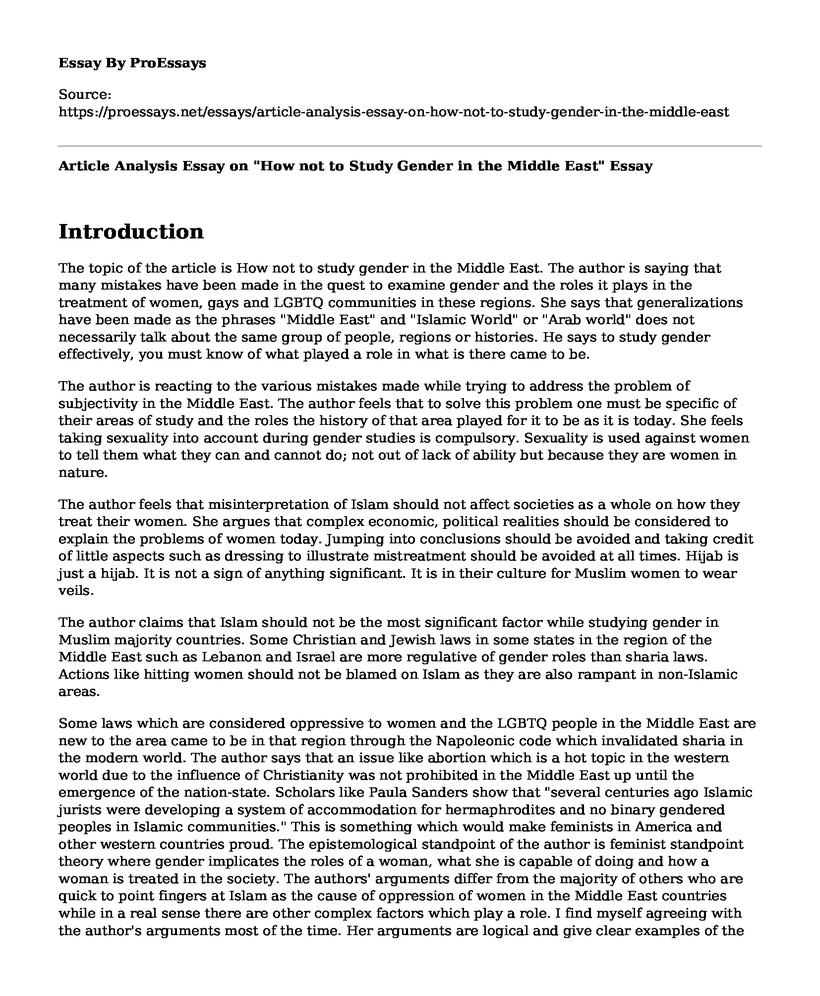Introduction
The topic of the article is How not to study gender in the Middle East. The author is saying that many mistakes have been made in the quest to examine gender and the roles it plays in the treatment of women, gays and LGBTQ communities in these regions. She says that generalizations have been made as the phrases "Middle East" and "Islamic World" or "Arab world" does not necessarily talk about the same group of people, regions or histories. He says to study gender effectively, you must know of what played a role in what is there came to be.
The author is reacting to the various mistakes made while trying to address the problem of subjectivity in the Middle East. The author feels that to solve this problem one must be specific of their areas of study and the roles the history of that area played for it to be as it is today. She feels taking sexuality into account during gender studies is compulsory. Sexuality is used against women to tell them what they can and cannot do; not out of lack of ability but because they are women in nature.
The author feels that misinterpretation of Islam should not affect societies as a whole on how they treat their women. She argues that complex economic, political realities should be considered to explain the problems of women today. Jumping into conclusions should be avoided and taking credit of little aspects such as dressing to illustrate mistreatment should be avoided at all times. Hijab is just a hijab. It is not a sign of anything significant. It is in their culture for Muslim women to wear veils.
The author claims that Islam should not be the most significant factor while studying gender in Muslim majority countries. Some Christian and Jewish laws in some states in the region of the Middle East such as Lebanon and Israel are more regulative of gender roles than sharia laws. Actions like hitting women should not be blamed on Islam as they are also rampant in non-Islamic areas.
Some laws which are considered oppressive to women and the LGBTQ people in the Middle East are new to the area came to be in that region through the Napoleonic code which invalidated sharia in the modern world. The author says that an issue like abortion which is a hot topic in the western world due to the influence of Christianity was not prohibited in the Middle East up until the emergence of the nation-state. Scholars like Paula Sanders show that "several centuries ago Islamic jurists were developing a system of accommodation for hermaphrodites and no binary gendered peoples in Islamic communities." This is something which would make feminists in America and other western countries proud. The epistemological standpoint of the author is feminist standpoint theory where gender implicates the roles of a woman, what she is capable of doing and how a woman is treated in the society. The authors' arguments differ from the majority of others who are quick to point fingers at Islam as the cause of oppression of women in the Middle East countries while in a real sense there are other complex factors which play a role. I find myself agreeing with the author's arguments most of the time. Her arguments are logical and give clear examples of the real situation on the ground.
Conclusion
In conclusion, I feel that more nonpartisan studies should be carried out without trying to implicate one side over the other. In this way, we are likely to come across more enlightening facts than what we already know.
Cite this page
Article Analysis Essay on "How not to Study Gender in the Middle East". (2022, Dec 07). Retrieved from https://proessays.net/essays/article-analysis-essay-on-how-not-to-study-gender-in-the-middle-east
If you are the original author of this essay and no longer wish to have it published on the ProEssays website, please click below to request its removal:
- Paper Example on Sexual Orientation and Gender Identity Policies in Schools
- Axiology Essay Example
- Essay Sample on The Three Religions: Judaism, Christianity & Islamism
- Gay Rights: A Debate on the Increase and Persistence - Essay Sample
- Paper Example on Understanding Worldviews: A Historical Perspective
- Paper Example on Adolescents Need Sexuality Education for Healthy Sexual Outcomes
- Post Natal Depression in Teenage Mothers in the United Kingdom







